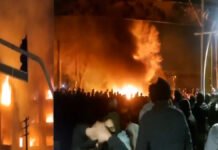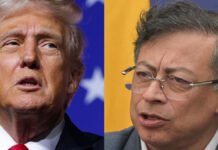The United States has intensified its stance against foreign interference in its democratic processes by imposing sanctions on Russian and Iranian entities. This decisive action underscores the U.S. government’s commitment to safeguarding the integrity of its electoral system and combating misinformation campaigns orchestrated by external adversaries.
Details of the Sanctions Imposed
The U.S. Department of the Treasury revealed targeted sanctions against key organizations tied to Russia and Iran. Among those affected are:
- Iran’s Islamic Revolutionary Guard Corps (IRGC) and its subsidiary, Cognitive Design Production Center.
- Russia’s Center for Geopolitical Expertise, an entity allegedly funded by Russian ideologue Alexander Dugin.
These sanctions aim to curb activities designed to manipulate public opinion and undermine democratic institutions.
Russian Entity’s Role in Spreading Misinformation
The Center for Geopolitical Expertise, identified as a collaborator with Russia’s military intelligence agency (GRU), stands accused of executing a sophisticated misinformation campaign during the U.S. presidential election. This campaign leveraged:
- Artificial intelligence (AI) tools to fabricate and disseminate fake news.
- A network of over 100 websites dedicated to amplifying false narratives.
The GRU reportedly provided both financial and operational support to the Center, enabling it to influence public discourse and create divisive narratives targeting American voters.
Iran’s Contribution to Election Interference
The IRGC’s subsidiary, Cognitive Design Production Center, has also been implicated in similar efforts. U.S. authorities assert that this Iranian entity sought to exploit social and political tensions in the United States, further dividing the electorate through the dissemination of propaganda.
Misinformation Tactics Deployed
The misinformation campaigns orchestrated by these entities shared common strategies aimed at destabilizing democratic norms:
- Artificial Intelligence Utilization: Sophisticated AI systems were employed to generate fake news articles and social media posts.
- Targeting Political Figures: Baseless accusations against candidates, particularly vice-presidential nominees, were circulated to sow doubt and confusion.
- Weaponizing Social Media: A well-organized network amplified these narratives, ensuring widespread visibility and engagement.
Statements from U.S. Officials
In announcing these sanctions, Bradley Smith, Acting Under Secretary of the Treasury for Terrorism and Financial Intelligence, declared:
“Iran and Russia’s governments have directly targeted our electoral processes. By spreading false information and dividing our citizens, they have sought to weaken our democracy. We will remain vigilant against any adversaries attempting to undermine our democratic institutions.”
This statement reflects a broader strategy to deter future interference and hold malign actors accountable for their actions.
Implications for the 2024 Presidential Election
With the 2024 U.S. presidential election on the horizon, these sanctions highlight growing concerns about external efforts to influence voter behavior. The stakes are high, as such interference could:
- Erode public trust in democratic systems.
- Amplify domestic divisions by exploiting sensitive socio-political issues.
- Undermine candidate credibility through fabricated scandals and misinformation.
The sanctions aim to send a clear message that any attempts to interfere with U.S. elections will be met with robust countermeasures.
A Closer Look at Key Entities
Center for Geopolitical Expertise
- Funded by Alexander Dugin, a prominent pro-Kremlin political philosopher.
- Operated as an extension of Russia’s military intelligence, receiving directives and financial backing.
- Built a misinformation infrastructure comprising AI-driven platforms and a sprawling network of websites.
Cognitive Design Production Center
- A subsidiary of Iran’s IRGC, notorious for its propaganda campaigns.
- Leveraged advanced technologies to manipulate public opinion during critical election periods.
Global Repercussions and Responses
The imposition of sanctions also serves as a warning to other nations that might consider similar tactics. The move has drawn mixed reactions on the global stage:
- Allied nations, such as members of NATO, have expressed support for the U.S.’s proactive measures.
- Russia and Iran, predictably, have denied the allegations, accusing the U.S. of politicizing international relations.
















